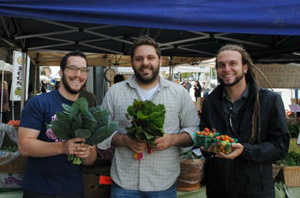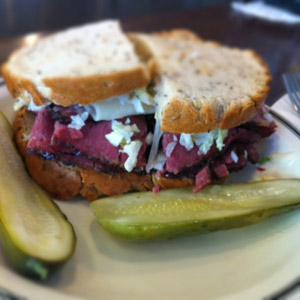Wise Sons Deli Comes to the Market
October 14, 2011
Note: This feature was written by Michelle Venetucci Harvey, CUESA’s volunteer coordinator.
 While your perception of Jewish deli food may conjure up images of sky-high piles of generic meat on rye bread, a new addition to the Tuesday market harkens back to an older—and more sustainable—idea of Jewish food. Wise Sons Jewish Delicatessen was launched with the hope of serving Jewish deli food made “from scratch and with love,” something the owners found lacking in the Bay Area.
While your perception of Jewish deli food may conjure up images of sky-high piles of generic meat on rye bread, a new addition to the Tuesday market harkens back to an older—and more sustainable—idea of Jewish food. Wise Sons Jewish Delicatessen was launched with the hope of serving Jewish deli food made “from scratch and with love,” something the owners found lacking in the Bay Area.
“People today are really starting to think about what they’re eating in general, but if you go get a pastrami sandwich, the meat is generally not of good quality and origin, and it all tastes the same,” says Wise Sons co-owner Evan Bloom. “We decided that it doesn’t have to be that way.”
Bloom and Leo Beckerman (pictured center and right) met in college at Berkeley and founded Wise Sons after years of witnessing a decline in the quality and abundance of Jewish deli food (both can easily spout childhood stories filled with babkas and pastrami). Taking matters into their own hands, they started tinkering with pastrami recipes on a gas smoker in Bloom’s backyard, and with the urging of family and friends, they eventually quit their day jobs to open a deli. In January 2010, they got their start as a weekly pop-up in a restaurant space and they continued developing their menu, making contacts, and expanding to new locations. Last week they started serving at the Ferry Plaza Farmers Market, and they just signed a lease on their own space on 24th Street, with plans to open in 2012.
Traditional and Sustainable
A staggering amount of the menu is made in-house. “There was a time when every deli made its own product, and that changed as things became industrialized,” says Bloom. He and Beckerman decided to slim down their menu and focus on the key items they want from a Jewish deli, such as pastrami and pickles.
It is a credit to their devotion that they have yet to add matzo ball soup to the menu, because, as Beckerman says, “We want it to be perfect, and we’re not working out of a location that allows that yet.”
Beckerman is quick to note that handmade and traditional Jewish deli food is, in many ways, “inherently sustainable.”
“Deli food is peasant food,” he explains. “We use tough cuts of meat, root vegetables, pickled vegetables—all things that are hearty but used to be considered poor-people food.”
The pounds of meat that are now standard on deli sandwiches in New York are, as Beckerman details, a product of the abundance of food after World War II. “It’s only been in the past 60 years or so that it’s been like this, and it’s a response to the have-not conditions of before. [Our food] references the pre-World War II time, when many elements of Jewish deli food were sustainable.”
Bloom and Beckerman are careful to point out that using a ton of red meat is not the most sustainable practice, and they take pride in their sourcing and the quality of the cuts they use. They source meat locally whenever they can, using chicken from Fulton Valley Farms, turkey from Diestel Turkey Ranch, some beef from Prather Ranch, and local fish. The bulk of their beef comes from Creekstone Farms in the Midwest, a source they feel is able to balance quality and quantity.
“We’re very happy with the cut and quality of the meat we get from Creekstone Farms because it’s a hormone-free, antibiotic-free product,” says Bloom. “And with the amount of beef we use in just one day, there is no viable local ranch that can supply us.”
“Some customers are quick to walk away when they hear that our meat isn’t local,” adds Beckerman, “but I would much rather have my meat coming from a little farther away than from animals living in poor conditions. That’s not something that we promote.” They have tested a variety of farms and cuts, both grass-fed and local, and feel that the end result is the best product they can offer.
The produce on their menu changes seasonally as well. “There are people that won’t get it. They say they want their bagel with a tomato, but tough,” says Bloom. “I’m waiting until the season when they’re excellent, because it’s our responsibility to give you the best tasting product possible.” Moving forward, Bloom and Beckerman are excited to start purchasing more of their food from the farmers at Ferry Plaza and streamlining their service.
 What customers may not realize is that each pastrami sandwich is sliced to order, and both founders fervently agree that they will never get a machine slicer. They believe the skill and attention that goes into every sandwich is part of what makes them unique.
What customers may not realize is that each pastrami sandwich is sliced to order, and both founders fervently agree that they will never get a machine slicer. They believe the skill and attention that goes into every sandwich is part of what makes them unique.
So while customers will have to learn to do without tomatoes in the winter, Wise Sons promises a culinary and cultural experience.
“We’re both really excited to be part of the farmers market at the Ferry Building,” says Bloom. “We looked at each other on Tuesday and said, ‘Is this really happening?’ It’s a compliment unlike one we’ve received before.”
Wise Sons Jewish Delicatessen is now a permanent fixture at the Ferry Plaza Farmers Market, where customers can find them between 10 am and 2 pm every Tuesday.
Topics: Food makers, Meat/poultry, Small business

